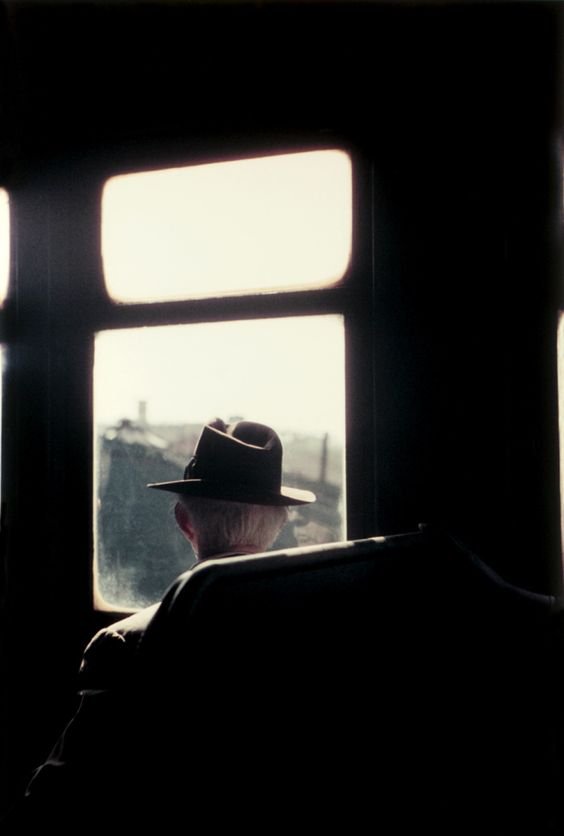BRAIN FOOD : FALL/WINTER 2018
{Originally published March 16, 2019}
The once-in-a-while content roundup is here! We live in a world that seems to be spinning faster every minute, with hot takes and quick media nearly drowning us with options. This is a ‘cold takes only’ zone. In this section, you’re going to find thoughtful, well-crafted work I’ve enjoyed or been inspired by over the last couple of months that will give you some food for thought, a new perspective, or a laugh. Every last bit of content is free, and linked - just look for words that are bold and orange.
As ever, a link in this rundown does not indicate a whole-hearted endorsement of the persons or organizations behind the content, and any link containing some adult language or content is marked with a star (*) so that you can peruse at your own discretion.
VISUAL - * SAUL LEITER
Leiter was an understated, fly-on-the-wall style photographer based out of New York City. He started using color photography back when color photography was seen as down market by the artistic, and made some truly lovely work that celebrates the quiet moments of the everyman. Also: he’s the king of sub-framing.
LISTENED
The Longform Podcast - * Once a week, the team releases about an hour’s worth of conversations with writers who are creating meaningful work. They talk about past, present, and future projects, as well as the writer’s path and techniques. The fact that this is a free resource boggles my mind, but I’m so thankful for it! If it’s new to you, the episode with Elizabeth Gilbert is a great place to start (she talks about being an imaginative child, the difference between ego and spirit, and how it feels to start out in an industry full of rejection).
Revisionist History, with Malcolm Gladwell. Sometimes events, ideas, and people are not what they seem at first glance. Gladwell takes a good long look at his subjects and ensures that you walk away with an understanding of something you have probably taken for granted - or not noticed at all. A good introductory episode is Free Brian Williams (you’ll walk away doubting your own memory of this morning’s breakfast, it’s great).
On Writing, by Stephen King - * I know, I know. You saw the name Stephen King, thought blood, gore, and demons, and checked out. Well, come back for a moment. King’s book is not ‘On Writing Horror’, it’s simply ‘On Writing’. With his delightfully northeastern brusqueness (and language), he strips away the mythology around a writer’s work, and prepares you to dig in and labor a bit. He manages topics from the mechanics of writing (active tense, adverbs, whether or not to end a sentence with a preposition) to the art of it, from living sustainably as a working artist to what to do after you’re published, all in a way that is not patronizing. It has the tone of a friend placing their arm around your shoulders so that they can tell you some helpful (but somewhat uncomfortable) truths.
WATCHED
How Trader Joe’s gets you to spend money (and be happy about it). I just got introduced to TJ’s last month, and after walking out with far more flowers than I intended to buy, I’m admittedly a believer.
3 concrete ways to set goals for the new year, by the always-hilarious Evelyn from the Internets. Give it a watch for wisdom like, “The big difference between you, and someone in a position higher than you is not necessarily always talent...they just got it done. They’re doing it. Are you a better writer? We don’t know, because you’re too scared to finish your short story. Meanwhile they got it done.” My cowardly lion self dearly needed to hear that in January.
Tolstoy vs. Dickens. An hour and a half of debate over the two authors’ better points and failings, supplemented by dramatic readings. The two debating professors are wonderfully British, the debate is friendly, and you will come away knowing much more about both authors (the same group also hosted a debate on Austen vs. Emily Brontë, which provides great food for thought).
For laughs, Icelandagram. If you’ve been on Instagram for more than five minutes in the last two years, you’re sure to the loving jab at travel influencer types.
Nothing to do with resources, but I am excited that my iPhone photography game is improving, so you’ll just have to bear with me. Plus, it helps break things up visually.
READ
The Challenging Joy of Communal Living, by Stephanie Laferriere. Whether your roommate is a stranger, a spouse, a parent, or a friend, living together will expose everyone’s rough edges. I’m not always a joy to live with (please, try to hide your shock). The people that I share a house with do not always feel like a complete gift, either. The good thing is that the gospel meets us there, and prepares us to love the people in our immediate community well.
Why You Should Aim for 100 Rejections in a Year, by Kim Liao. Liao reframes the idea of rejection from a soul-crushing flat no to a signpost pointing you onwards and upwards. Plus, reminders that all rejection is not personal, and that in the world of creative pitching, often there are number games involved.
The Existential Void of the Pop-Up ‘Experience, by Amanda Hess. A look at the pop-y attractions and installations made and visited exclusively for the purpose of sharing online.
Minimalism is Just Another Boring Product Wealthy People Can Buy, by Chelsea Fagan. I’ve had a distaste for minimalism for a long time, but had a difficult time distilling it into words. Thankfully, Chelsea has done it for me. A snippet:
“…What is hashtag problematic about it is pretending that this is somehow a noble or morally-positive way to spend your money. It is just another form of conspicuous consumption, a way of saying to the world, ‘Look at me! Look at all of the things I have refused to buy, and the incredibly-expensive, sparse items I have deemed worthy instead!’ And we are entitled to buy whatever we like, but to pretend that the intentional and costly up-front implications of a minimalist-chic life are anything but privileged posturing is ridiculous. But I believe that we feel these things because the minimalism-as-luxury-good phenomenon is extremely caught up with the minimalism-as-faux-spiritualism phenomenon, which is its own can of farm-to-table, artisanal worms.”
Jane Eyre Isn’t the Romance You Want It To Be, by Erin Blakemore. I distinctly remember being really confused the first time that I heard Jane Eyre described as a romance, because to me it was far more of a coming-of-age story. Blakemore breaks down why Charlotte Brontë’s most famous work is neither a case of old world romance, nor a feminist relationship manifesto.
Here endeth the links. The Brontë sisters are thankful you stayed this long.






